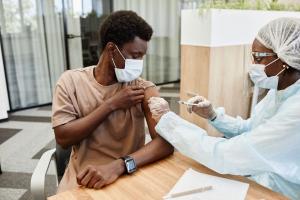Country support missions to help drive optimal COVID-19 vaccine uptake across Africa
Brazzaville – World Health Organization’s Regional Office for Africa (WHO AFRO) multidisciplinary teams of specialists are set to be deployed to about 15 African countries. They will address obstacles that are impeding the uptake of COVID-19 vaccines, with a view to supporting national authorities achieve the 10% coverage target for all populations as soon as possible, and 40% by the end of the year.
With the aim of optimizing COVID-19 vaccine introduction by addressing bottlenecks and providing targeted support to identified countries, the country support missions are focused on achieving three outcomes:
- Identifying key gaps that are negatively impacting the COVID-19 vaccine rollout in identified countries.
- Providing targeted support to assist these countries optimize their rollout.
- Strengthening existing capacity and country response to achieve optimal vaccine uptake.
Importantly, says Dr Richard Mihigo, Immunization and Vaccines Development Programme Coordinator in WHO AFRO, missions will also set the stage for the maintenance of a much broader dialogue with countries, to ensure revitalization plans are monitored and supported into the future.
Currently, Africa has made only modest progress in COVID-19 vaccination, with 15 countries meeting the 10% vaccination target by the end of September. Countries still have a long way to go to reach the year-end target of fully vaccinating 40% of their populations.
“In terms of overall COVID-19 response, many countries are struggling to optimally utilize the available resources. This situation, in the context of the broader ecosystem, will be analysed during these missions to help us reach a point where we have established continuous dialogue,” Dr Mihigo explains.
These country support missions will be dispatched to countries prioritized into two different phases, including 15 during Phase 1 and a further 14 in Phase 2. Countries identified for inclusion in Phase 1 include Burundi, Democratic Republic of Congo, Central African Republic and Chad in Central Africa; Guinea Bissau, Liberia, The Gambia, Burkina Faso and Nigeria in West Africa; and Zambia, Malawi, Ethiopia, South Sudan, Mozambique and Madagascar in East and Southern Africa.
Support will be carefully tailored to country needs, with the work of the support missions developed in terms of very detailed methodology, according to Dr Mihigo. Analyses are currently conducted country by country to identify bottlenecks beyond the actual availability of vaccines. Teams will engage in-country with national Ministries of Health and WHO country offices and with other partners bilaterally where appropriate.
WHO AFRO’s New Vaccines Introduction Medical Officer, Dr Phionah Atuhebwe, who will participate in several of the support missions, highlights lack of vaccine delivery information, especially as shipments are ramping up towards the end of the year, as one of the greatest impediments to effective vaccination uptake in Africa. Other critical bottlenecks will be identified via a support focal person in each country, who will conduct a root cause analysis to identify gaps in the vaccine rollout.
“The in-country visit will include an entry-level briefing, a review the activity plan and a review to identify bottlenecks, followed by the development of an action plan. This will necessitate site visits and engagement with country teams to provide effective support for the implementation of the plan.
“Monitoring of implementation of the plan will occur during post-mission visits to the countries, also allowing for periodic progress updates so we can document lessons learnt and best practices, while keeping abreast of ongoing challenges,” she says.



